

The “Workshop on Innovation and IP Protection for Chinese Enterprises in International Competition” was held successfully on June 15th, in Tongji University. Experts from China’s governmental authorities, judicial organs and internationally oriented enterprises attend the workshop and made in-depth discussion in three specific sessions, respectively “Policies Related to Promoting Enterprise Innovation and IP Utilization”, “Judicial Measures for Strengthening IP Protection”, and “IP Legal Compliance Management and Risk Control in International Overseas Development of Innovative Enterprises”. The workshop was held jointly by Shanghai College of International Intellectual Property (SICIP) of Tongji University, Center for Intellectual Property Study of Fudan University, and Intellectual Property Law Association of Shanghai Law Society. Mr. Lv Guoqiang, Counsel of World Intellectual Property Organization (WIPO) and director of Shanghai Intellectual Property Society, and Prof. Feng Shenhong, Vice Secretary of CPC Party Committee of Tongji University, respectively made a keynote address to open the workshop.
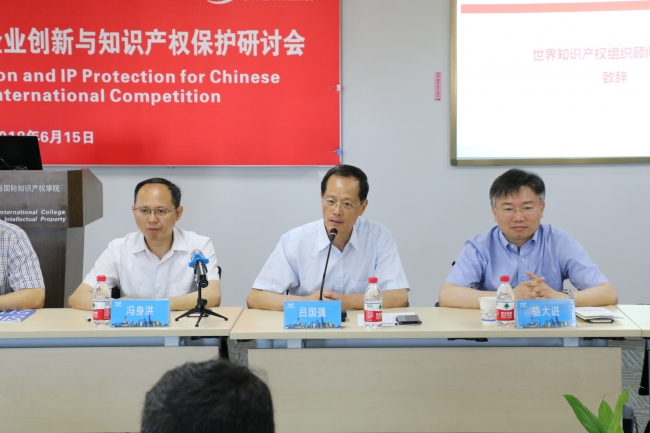
In the first session of“Policies Related to Promoting Enterprise Innovation and IP Utilization”, Chang Xinshi, Division Head of General Office of China’s Ministry of Science and Technology, made a report about “New Challenges Confronted in China’s Science and Technology Innovation”, and pointed out that, the new age in China poses new challenges mainly in respect of China’s capacities in independent R&D, pioneering prospective scientific perspective, and activeness in formulating new industry development standards and rules. Presently, Chinese enterprises should create more technology standards and industry rules, and develop capacity to promote these standards and rules to broader parts of the world.
Han Xiucheng, Intellectual Property Development and Research Center of State Intellectual Property Office, pointed out in his speech “Creating High Value Patents, Carefully Arranging Overseas Market”, that patent applications in China is undergoing a transition of from quantity to quality;since China encourages enterprises to create “high-value patents” as innovators, it’s necessary that the patents created have not only high-quality technical innovation and legal authorization, but also high-value market, namely a combination of “technological quality, legal quality and commercial quality”. Though the number ofinvention patents from China are increasing in recent years, the number of PCT overseas patents application is still relevantly low, even compared with other developing countries such as Brazil, Mexico, Malaysia and South Africa; Therefore, China’s enterprises should cultivate high-value patents at the beginning of its innovation plans, and should carefully arrange their international markets through priority on IP, and only in this way can they develop their own competitiveness.
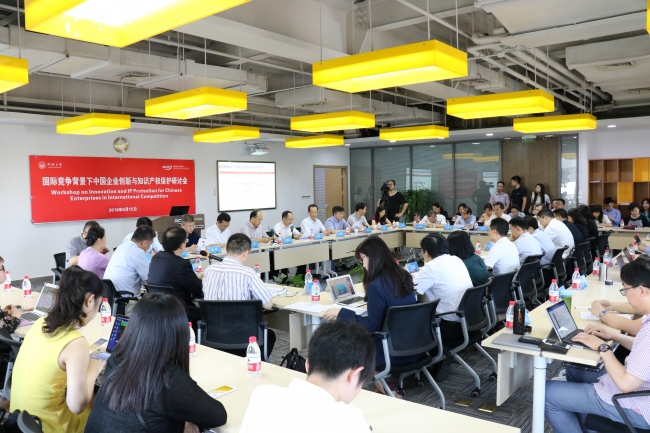
As a commentator for the first session, Luo Dajin, Director of Shanghai Institute for Science of Science commented that, China’s science and technology is transiting from “following” to “keeping up” or “leading”, and accordingly, relevant strategies and tactics need to be adjusted, in order to transfer from “emphasis on quantity” to “emphasis on quality”. Gradually, China is capable of and conducting more interdisciplinary, cross-cutting arrangements, and producing more key original innovations, among which, utilization, management and protection of invention patents become an especially important aspect. Song Xiaoting, professor of SICIP of Tongji university, also made a comment that “trade conflicts” are essentially “competitions in science and technology”, and in order to tackle such conflicts, China has to realize overtaking in the races in emerging new industries. In this regard, IP can be used to unite relevant participants and form a huge benefit community of scientific innovation.
In the second session of “Judicial Measures for Strengthening IP Protection”, Tang Zhen, deputy presiding judge of Intellectual Property Division of Shanghai High People’s Court made a report, “Paths for Protecting Trade Secrets of Innovative Enterprises ”. In the report, Judge Tang stated that trade secrets are generating increasing importance in the development of technology and competitions. Innovative enterprises bear high expenses of R&D as well as high risks, and therefore, the protection of their trade secrets should be based on their own precautions and measures at first place. Then Judge Tang offered specific paths for protecting trade secrets from four perspectives of facilities guarantee, software management, employee management, and administrative rules.
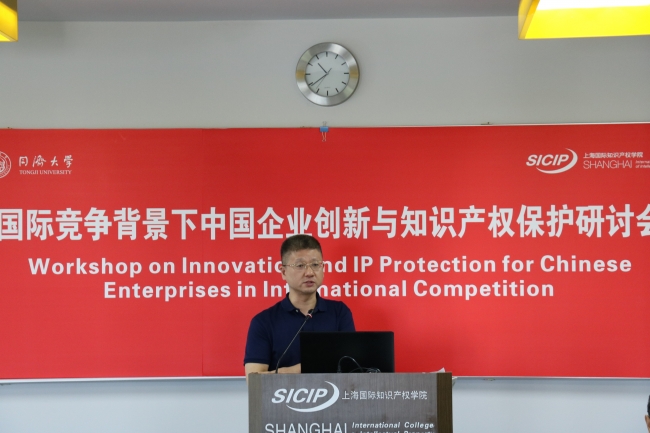
Zhang Feifei, Deputy Investigator in Economic Investigation Department of Ministry of Public Security, made a speech of “Enforcement Practices of Combating Intellectual Property Crimes”, in which she pointed out that IP related crimes are increasing and spreading as economy grows. China’s Ministry of Public Security has been innovating in mechanisms and measures to improve the effect of combating such crimes, including acceleration from “accurate combating” to “whole process combating”, and further to “cluster scale campaign”. In 2013, a group of intelligence guidance was established and investigations guided by intelligence have been made as regular work. In the future, further exploration will be made for new strategies which will be based on big data and meet the new era requirements.
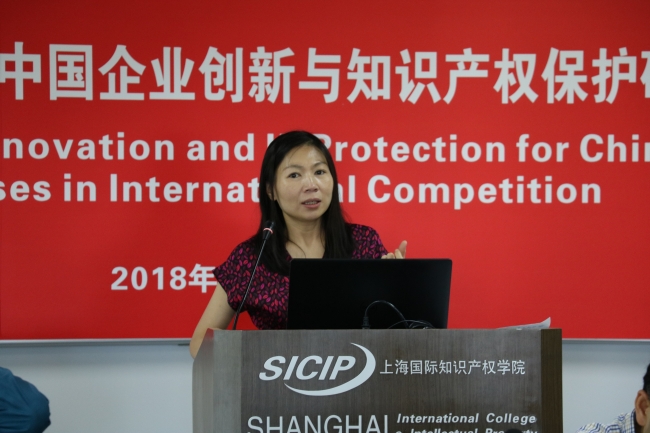
Yang Jianfeng, Third Rank Prosecutor of Civil and Administrative Division of Shanghai People’s Procuratorate, made a speech about “Advances of Intellectual Property Public Interests Litigation”, in which he stated that, the trade war between China and U.S. which generate great attention is centered on interests based on IP, while what’s behind this is far reaching issues of international interests and public interests, all of which require deep involvement of IP litigation for public interests. He then introduced this new development in four dimensions, namely features, necessity, judicial paths and remaining problems related to IP litigation for public interests.
Xie Yan, Associate Professor of SICIP of Tongji University made a speech about “Application of Laws in Punishing IP Crimes”, where she emphasized the importance of establishing a “legal community” in this regard.
In the third session of “IP Legal Compliance Management and Risk Control in International Overseas Development of Innovative Enterprises ”, Ma Zhongfa, Professor of Center for Intellectual Property Study of Fudan University, made a report about “Green Development and International Legal System related to Technology under Belt & Road Initiative ”, in which he suggest that there should be established a technology transfer mechanism under Belt & Road Initiative, not only protecting interests of China’s enterprises, but also providing necessary support for Belt & Road related countries through proper means of mere technology transfer or equipment technology transfer, so that China may play a role it should in the constructing of “human destiny community”.
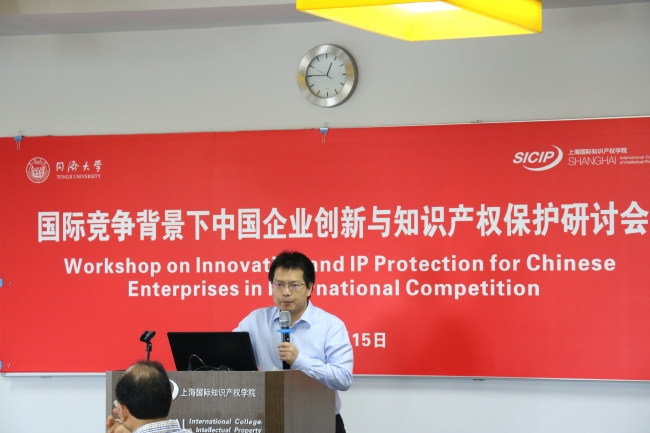
Zhang Zhongqing, supervisor of litigation administration department of Huawei Co., in his speech “Intellectual property risks and solutions for enterprises developing overseas markets”, introduced the features and responsive measures for IP risks from U.S. and European countries. He also pointed out that, China has become a major manufacturer as well as seller in global electronic industry. Presently, patent opportunist companies would not choose China’s courts to conduct litigation, and would rather resort to regions where there is only small amount of sales, in a way of opportunism in forum shopping, which causes great challenges for China’s judicial sovereignty.
Xu Ming, Associate Professor of SICIP of Tongji University, made a speech about “Deferred Prosecution Agreement in U.S.”, where he introduced ZTE’s deferred prosecution agreement with U.S. investigative authorities.
As a commentator in this session, Guo Jun, Director of Beijing W & H Law Firm Shanghai Branch, stated that when China’s enterprises develop overseas markets, they should attach more importance to market security, in which IP plays an extremely important role.
Besides, experts from other research institutions, enterprises and law firms including Chinese Academy of Social Sciences, Tsinghua University, East China University of Science and Technology, Advanced Micro-Fabrication Equipment Inc., Lubansoft Co., Unitalen Law Offices, All Bright Law Offices, also attended the workshop and shared their professional views from perspective of both academic and practical perspectives.
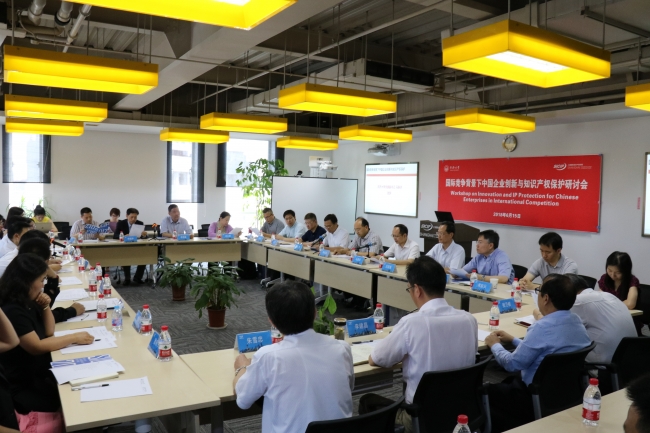






 0086-021-65983113
0086-021-65983113  sicip_intoff@tongji.edu.cn
sicip_intoff@tongji.edu.cn